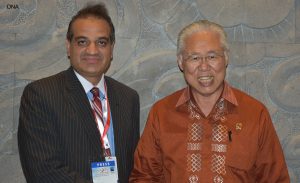TRADE MINISTER TALKS TO DNA. FULL INTERVIEW TO BE PUBLISHED
IN THE NOVEMBER 2018 ISSUE (Next Week) OF CENTRELINE magazine.
DNA to release Part II of this interivew also.
By Ansar Mahmood Bhatti in Jakarta
JAKARTA, OCT 26 (DNA) -The Trade Minister of Indonesia Mr. Enggartiasto Lukita has said huge scope of bilateral cooperation existed between Pakistan and Indonesia adding Pakistan should focus on Indonesian markets for import of various items.
He said Indonesia and Pakistan have very close relations therefore both countries should benefit from each other’s experiences. Since Indonesia has a lot to offer to Pakistan therefore proximity of our relations requires both of us to boost bilateral trade and economic activity.
The Indonesian trade minister said this while giving an exclusive interview to DNA, on the sidelines of 33rd Trade Expo being held in Jakarta.
He said, the Indonesia’s exports to Pakistan from January to September 2018 reached USD 1.8 billion (decrease 1.2%YoY), consisting of non-oil and gas exports of USD 1.7 billion (decrease 5.8% YoY) and oil and gas exports of USD 83.0 million (increase significantly from the same period the previous year which only reached USD 5.8 thousand).
Meanwhile, Indonesia’s imports from Pakistan from January to September 2018 from the non-oil and gas sector reached USD 467.4 million (increase 233% YoY).
Indonesia- Pakistan trade balance for January-September 2018 surpluses USD 1.3 billion, consisting of a non-oil and gas surplus of USD 1.2 billion and oil and gas amounting to USD 83.0 million, he added.
The minister said as the one of main trading partner, Indonesia-Pakistan has signed an Indonesia Pakistan Preferential Trade Agreement (IP-PTA) cooperation agreement in 2012. This agreement entered into force on 1 September 2013 after going through the ratification process in both countries.
After three years of the implementation, review and negotiation process, it was finally agreed to amend on January 2018, to create more beneficial agreement for both countries, he added.
To a question about further diversifying bilateral cooperation the minister said, “We believe that long lasting relationship must be rooted to the mutual benefits between both countries. We must create a trading system that allow for fair trade. Trade is not a zero-sum game, Trade is about partnership, Trade is about trust, and Trade is about growing together”.
While sharing his view about CPEC, the Trade Minister said, the benefits of the One Belt One Road (OBOR) project are expected to be widespread throughout the South East Asia region.
The development of each economic corridor, from China into Central Asia, the Middle East, Europe, Southeast Asia and Africa will connect many remote locations to trading hubs, lowering entry barriers to supply chains.
The imagined routes cover more than 60 countries and regions, currently accounting for some 30 percent of global GDP and more than 35 percent of the world’s merchandise trade.
This may have a positive effect on trade, cutting the logistical cost of imports and exports. Allowing the vital development of renewable power infrastructure will also promote sustainable economic development in these regions. Theoretically with functioning transport links, infrastructure and affordable renewable energy supplies, local economies can grow, creating the ability to benefit from further investment opportunities, he added.
The minister said, however, CPEC project comes with risks including underdeveloped credit markets, inconsistent regulatory regimes and poor infrastructure, which make the initiation of local Belt and Road Initiative projects problematic.=DNA
=============












